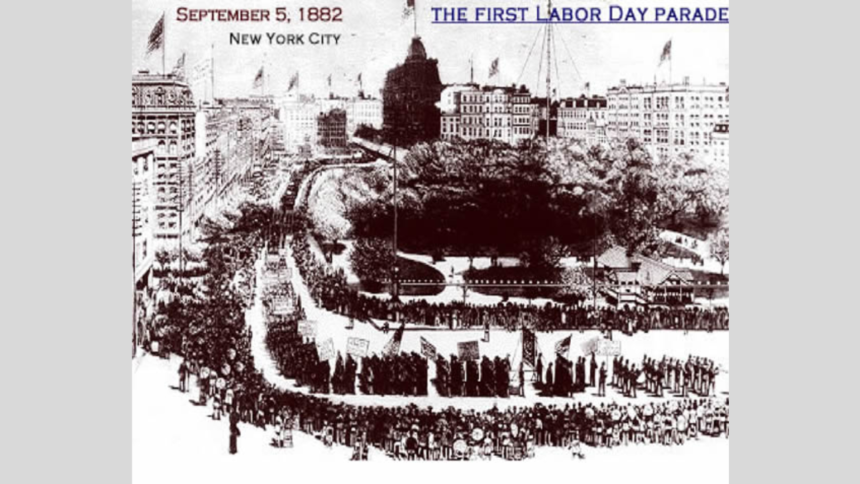Labor Day: A Simple History
Labor Day, celebrated on the first Monday of September, is a holiday dedicated to honoring the contributions and achievements of American workers. This day marks not only the end of summer but also a time to reflect on the labor movement’s significant role in shaping the nation’s workforce and improving working conditions. The origins of Labor Day are rooted in the late 19th century, a period marked by intense labor struggles and activism.
Early Advocacy and State Recognition
The concept of Labor Day began taking shape in the 1880s, a time when labor unions and workers’ rights advocates were becoming increasingly vocal about the need for improved working conditions and fair wages. During this period, industrialization was rapidly transforming the American economy, leading to long working hours, dangerous working conditions, and minimal worker rights. Labor unions began to form as workers organized to fight for better conditions, and the idea of having a day to celebrate their efforts emerged.
Before Labor Day was officially recognized nationwide, it was celebrated in various states, with each taking its own steps to acknowledge the contributions of workers. Oregon was the first state to officially recognize Labor Day as a public holiday. On February 21, 1887, Oregon passed a law making Labor Day an official holiday, setting a precedent for other states to follow. This early adoption reflected the growing recognition of labor’s importance and the need for a dedicated day of celebration.
Following Oregon’s lead, several other states began to adopt Labor Day legislation. By the end of the 1880s, states such as Colorado, Massachusetts, New Jersey, and New York had also passed laws recognizing Labor Day. This movement continued to gain momentum, and by 1894, a total of 23 states had adopted the holiday. The widespread support for Labor Day highlighted the growing influence of the labor movement and its impact on American society.

The Debate Over Labor Day’s Origin
One of the interesting aspects of Labor Day’s history is the debate over who first proposed the holiday. Two prominent figures, Peter J. McGuire and Matthew Maguire, are often credited with the idea, and each has a compelling claim to being the holiday’s originator.
Peter J. McGuire, a leader in the carpenters’ union and a co-founder of the American Federation of Labor (AFL), is frequently mentioned as the person who proposed Labor Day. In 1882, McGuire suggested the idea of a day to honor the laboring classes, describing it as a “general holiday for the laboring classes” to recognize their contributions to the country’s development. McGuire’s proposal was well-received by labor unions, and his role in advocating for Labor Day is widely acknowledged.
However, there is another significant claim to the origin of Labor Day. Matthew Maguire, a machinist and secretary of the Central Labor Union in New York, is also credited with proposing the holiday. According to some accounts, Maguire made the suggestion while serving as secretary of the Central Labor Union in New York in 1882. This claim is supported by historical research and documentation, which suggests that Maguire played a key role in organizing the first Labor Day parade and advocating for the establishment of the holiday.
In the years following the first Labor Day celebration, both McGuire and Maguire were involved in labor movements and advocacy efforts, and their contributions to the labor movement were significant. The debate over who first proposed Labor Day reflects the complex and collaborative nature of the labor movement, with many individuals working together to achieve common goals.
The First Labor Day Celebration
The first official Labor Day celebration took place on September 5, 1882, in New York City. The event was organized by the Central Labor Union, a prominent labor organization at the time. The celebration featured a parade that showcased the strength and solidarity of the labor movement. Workers from various industries marched together, demonstrating their unity and collective power.
The parade was followed by a festival for workers and their families. The festival included speeches, entertainment, and other activities designed to celebrate the achievements of workers and provide them with a day of relaxation and enjoyment. The event was a resounding success and set a precedent for future Labor Day celebrations.
Over time, Labor Day grew to include more formal elements, such as speeches and discussions about the importance of labor. Prominent figures and labor leaders would address the crowd, highlighting the achievements of the labor movement and advocating for continued progress in workers’ rights. The holiday became a platform for raising awareness about labor issues and promoting the values of the labor movement.
The Evolution of Labor Day
As Labor Day continued to be celebrated, it evolved to reflect the changing nature of the labor movement and the broader societal context. In 1909, the American Federation of Labor (AFL) convention introduced the concept of Labor Sunday, which is observed on the Sunday preceding Labor Day. Labor Sunday was dedicated to the spiritual and educational aspects of the labor movement, providing an opportunity for reflection and discussion about labor issues.
The addition of Labor Sunday emphasized the significance of Labor Day beyond just a day of celebration. It highlighted the ongoing efforts of the labor movement to address social and economic issues and promote the welfare of workers. Labor Day became a time to recognize the achievements of the labor movement and to advocate for continued progress in improving working conditions and workers’ rights.
Today, Labor Day is celebrated with a variety of activities and events across the country. Many people enjoy parades, picnics, and other festivities that mark the end of summer and honor the contributions of workers. The holiday serves as a reminder of the labor movement’s impact on American society and the importance of continuing to support workers’ rights and well-being.
Why Labor Day Matters
Labor Day is more than just a day off from work or the end of summer. It is a time to reflect on the hard work and dedication of American workers and to recognize their role in shaping the nation’s progress and prosperity. The holiday serves as a tribute to the labor movement’s achievements and the ongoing efforts to improve working conditions and promote workers’ rights.
The labor movement has played a crucial role in advancing economic and political democracy in the United States. Through collective action and advocacy, workers have fought for better wages, safer working conditions, and fair treatment. Labor Day provides an opportunity to celebrate these achievements and to acknowledge the contributions of workers to the nation’s strength and prosperity.
As we observe Labor Day, it is important to remember the historical context in which the holiday was established and to continue supporting efforts to improve the lives of workers. The holiday serves as a reminder of the progress that has been made and the work that remains to be done to ensure that all workers are treated with dignity and respect.
In summary, Labor Day is a significant holiday that honors the contributions and achievements of American workers. From its early beginnings in the 1880s to its status as a national holiday, Labor Day reflects the labor movement’s impact on American society and the ongoing efforts to improve workers’ rights. As we celebrate Labor Day, we recognize the hard work of American workers and reaffirm our commitment to supporting their well-being and advancement.



